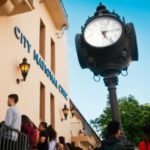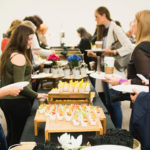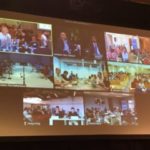
When the Electrochemical Society (ECS) booked its 2015 Conference on Energy Conversion & Storage With Soil Oxygen Fuel Cells at Glasgow’s Scottish Exhibition + Conference Centre (SECC) seven years ago, the city already had a reputation for being active in renewable energy. “But,” said Christie Knef, ECS’s director of meetings, “they certainly weren’t where they are today.” By the time the meeting was held this past July, Glasgow had emerged as a leader in the field in the U.K., home to a world-class renewable-energy academic research center and startup accelerator, and well on its way to its goal of becoming a zero-carbon city by 2020.

From Knef’s point of view, the destination could not have been more in tune with ECS’s conference, where researchers from more than 40 countries gathered to talk about innovation in fuel cells and batteries. In addition to providing access to expert speakers from Glasgow’s research community — and a nerd-friendly venue, the Glasgow Science Centre, for ECS’s banquet — partnerships between the Glasgow City Marketing Bureau, the SECC, and the Scottish government paved the way to bring Fergus Ewing, Scotland’s minister for business, energy, and tourism, to the meeting. Ewing discussed Scotland’s renewable-energy programs and goals with attendees, Knef said, “and characterized why Glasgow was a natural fit for our conference.”
A lot was riding on the success of the conference, which represented the first time ECS was holding a satellite meeting in Europe. Glasgow’s concentration of cutting-edge research in renewable energy helped bolster attendance, because many potential attendees are academics who face funding restrictions, and meeting in a destination dense with industry-specific resources “made it more likely that they could attend,” Knef said. While ECS had set a target of 650 attendees, the conference ended up drawing 800.
When you’re looking at organizing successful meetings from a global perspective, there is “a very long list of things that come into play,” Knef said. But ECS’s experience demonstrated the value of connecting meetings to a research- and science-heavy destination aligned with attendee interests. To have it be so successful “was a big relief on our end.”
A NEW MAP OF THE WORLD
The ECS conference is a near-perfect example of how aligning an individual meeting with the intellectual resources of a destination can add value for both organizers and attendees. And hosting an international delegation of scientists was a win for Glasgow, beyond the immediate financial benefits of the meeting, helping the once smoky, industrial city burnish its reputation as a center for scientific innovation. The meeting also illustrates a larger trend, one that researchers at the University of Toronto’s Martin Prosperity Institute have described as an “epochal” transformation — the global shift away from economies powered by natural resources and large-scale industries, toward economies in which creativity and knowledge are primary drivers.
As a result of that shift, cities are entering a new era of competition, as they remake their identities and rebrand themselves around clusters of innovation, according to Greg Clark, an expert on and consultant to cities, delivering the keynote address at AIPC 2015, the International Association of Convention Centres’ Annual Conference and General Assembly, in Boston last July. Rapid globalization, triggered by the 2008 financial crisis, is helping draw what amounts to a new map of the world, Clark said. “There has been more change in the last five years,” he said, “than there was in 50 years before it.”

In North Carolina, the shift started decades ago, in a pine-forested region encompassing North Carolina State University in Raleigh, Duke University in Durham, and the University of North Carolina at Chapel Hill that came to be known as Research Triangle Park. The research park was a very successful — and widely copied — experiment in leveraging the intellectual assets already clustered in an area. Institutions began to collaborate with one another, sharing their research and facilities, and helped speed the transfer of ideas and innovation from academic labs to private companies. Research Triangle has now grown to include numerous universities and nearly 200 science and technology companies.

“The key verticals in our backyard used to be tobacco and textiles,” said Loren Gold, executive vice president of the Great Raleigh Convention & Visitors Bureau. Now they’re “great minds from an intellectual-capital standpoint” in academia, Gold said, “and movers and shakers in the amazing emerging industries in our STEM space.”
Positioning the area as a destination for STEM meetings — in science, technology, engineering, and math — is a strategy Visit Raleigh had been pursuing loosely for the past four or five years. In the last year, however, it has been formalized into practice. On its website, Visit Raleigh touts the fact that it has the third-largest biotechnology cluster in the United States and ranks in the top 10 in the world in clean technology, among other knowledge-economy calling cards.
The strategy is working, Gold said, aided by the collaboration of local meetings advocates such as Emlyn Koster, Ph.D., the high-profile director of the North Carolina Museum of Natural Science. Last October, the museum staff hosted the 2014 Annual Conference of the Association of Science–Technology Centers, which brought more than 1,700 delegates from 42 countries to Raleigh. Koster also played a role in bringing nearly 2,000 attendees from 38 countries to Raleigh for Evolution 2014, the joint annual meeting of the Society for the Study of Evolution, the Society of Systematic Biologists, and the American Society of Naturalists. And in February 2017, the museum will host the annual meeting of the Citizen Science Association.
The old ideal of a meeting attendee was someone who would come in, visit, spend money, and then leave. Now, the ideal visitor is one who visits, spends money, and leaves — and then we continue to have a dialogue.
Meeting sessions have been held at facilities including the museum and its conference center as well as the 500,000-square-foot Raleigh Convention Center, which is connected to the 400-room Raleigh Marriott City Center. But it’s the strength of the city’s intellectual, creative, and human capital, not its infrastructure, that the CVB now leads with. “We’re not about a building — or a bridge, or a beach, or a body of water,” Gold said. “We’re about connecting [meetings] to the people who live here and work here and create things day in and day out.
“The old ideal of a meeting attendee was someone who would come in, visit, spend money, and then leave,” he said. “Now, the ideal visitor is one who visits, spends money, and leaves — and then we continue to have a dialogue.”
THE CLUSTER EFFECT
For economic clusters like the long-established Research Triangle Park or the emerging renewable-energy hub in Glasgow to succeed, it’s not enough just to have a concentration of local resources, no matter how rich, according to Harald Bathelt, a professor of economic geography at the University of Toronto. The economic clusters that thrive also develop global links that can bring in new ideas and new technology. To be successful, Bathelt said, a region will have “a strong local buzz, and a global pipeline to the outside — to the most advanced customers, knowledge pools, universities, and research organizations throughout the world.”
That’s where meetings come in. Trade shows and conferences — particularly international flagship or hub events — can provide those kinds of links, Bathelt said. The fact that relationships between the temporary community that grows around a meeting and a destination’s permanent business and research community are mutually beneficial is clearly understood in Hamburg, Germany, where the city has sorted its economic strengths into eight clusters so it can systematically foster innovation, according to Florian Gerdes, marketing manager for conventions for the Hamburg Convention Bureau.

Conferences “strengthen the academic exchange in the city,” Gerdes said, “and shine the spotlight on Hamburg as an international knowledge hub.” As Hamburg’s expertise and reputation grow, “the easier it is to acquire congresses.” In turn, “the knowledge transfer triggered by congresses strengthens the industrial and scientific sector.”
Among the eight clusters that Hamburg has identified as its leading strengths is aviation. The city is the third-largest center for civil aviation in the world, and Germany’s Federal Ministry of Education and Research supports a strategy to make it a leading international center for aviation research and innovation. That expertise, as well as the local network that links industry, academia, the government, and the convention bureau, helped bring 700 delegates to Hamburg for the International Air Transport Association (IATA) 5th World Passenger Symposium this past October.
The convention bureau helped establish contacts between IATA and local partners, find speakers and local sponsors, and arrange for unique experiences, such as tours of Hamburg’s Airbus factory. The symposium was organized in conjunction with THack@Hamburg, a competitive hackathon for developers held at a local co-working facility and sponsored by the online travel publication TNooz. Participants created computer applications with IATA’s new open-source standard, and the results were presented at the symposium’s plenary session. Events such as the hackathon helped foster creative exchange among the local community and the symposium’s participants, who represented the world’s leading airlines and airports, travel agents, industry suppliers, and manufacturers.
‘AN INCREDIBLE BOOM’
Some events — particularly large international trade shows and conferences — can create global buzz. They’re so big and influential that when participants go there, they know they can find pretty much all the partners, information, and other resources they need. Which is why identifying and developing flagship events has become a key strategy at London & Partners, according to Zanine Adams, head of events and business development. London & Partners is a not-for-profit organization launched in 2011 by London’s mayor, Boris Johnson, to attract both investment and visitors to the city. The organization works with the mayor’s office to spotlight four areas that the city has identified as driving growth and investment in the city: technology, creative industries, life sciences, and financial services.

“From those sectors, we saw an incredible boom, and realized the opportunity to align ourselves to the meetings and events sector, because our role as London’s official convention bureau is to help drive events and congresses into London,” Adams said. “We also work very much more closely now with the event organizers in terms of helping them to enhance their events. A traditional CVB will do its best to try to win the event into London, but more and more now we sit down with the event organizer and see what it is that they’re trying to achieve in London, so that they’re maximizing their event opportunity, too.
“We’re not just trying as a convention bureau to fill our hotel rooms and venues, which of course we do on a day-to-day basis,” Adams said. “We want to get under the skin of the event and understand the content, so we can help them grow and be successful. It also puts a spotlight on London’s industry, the opportunities that we have in business here especially in those relevant sectors, and how we can help grow them as well and grow our talent in London.”
We’re not just trying as a convention bureau to fill our hotel rooms and venues, which of course we do on a day-to-day basis. We want to get under the skin of the event and understand the content, so we can help them grow and be successful.

London & Partners was a founder of London Technology Week, an annual series of events that was inaugurated in June 2014. This past June, Tech Week 2015 hosted 228 programs in 141 venues across London, attended by 43,000 people from more than 80 countries. Tech Week not only puts a spotlight on the city’s tech sector, Adams said, but also creates a platform for event organizers who want to bring their groups to London. This year, Tech Week included conferences, exhibits, parties, workshops, and networking events, held in a variety of spaces.
And because of the word of mouth it generates, “We don’t have to go out and bang the drum about Tech Week,” Adams said. “People are now asking, ‘Okay, what are the dates of Tech Week in 2016?’” The strategy has worked so well, Adams has been asked to create five more week-based programs. “We’ve recently launched London Entertainment Week, and we had Advertising Week Europe 2015,” she said. “We have event organizers that come to us saying, ‘We’re running a two-day forum. We want to turn this into a week, because we see the opportunity to align ourselves with other events that are taking place.’”
London & Partners has also helped forge new partnerships between event organizers. Two years ago, the organizers of the long-running Mobile Games Forum came to London & Partners and suggested they join forces with a competitor that organized a similar event the week before. “They realized that if they collaborate,” Adams said, “they could get more attendees to come to their event than if they worked side by side.” The result was the weeklong London Mobile Games Week, an event that attracted 12 times as many attendees as the Mobile Games Forum. “There were 730 industry leaders from around the world,” Adams said, “4,000 participants — 60 percent of which were international — and 620 major companies took part.”
With events of that magnitude, “We can then leverage our assets in terms of working with the government,” Adams said, “perhaps host something at the House of Lords, and they in turn will perhaps get more attendees.” Indeed, it was a success for London & Partners “because to create London Mobile Games Week puts the spotlight on the mobile-gaming industry in London. We see a benefit on both sides, not only in the fact that these two events have grown, but also they’ve consolidated to become a weeklong event activity with lots of programming. It’s win-win, I think, on both sides.”
Read more about Melbourne’s role in the evolving landscape of global knowledge hubs.



